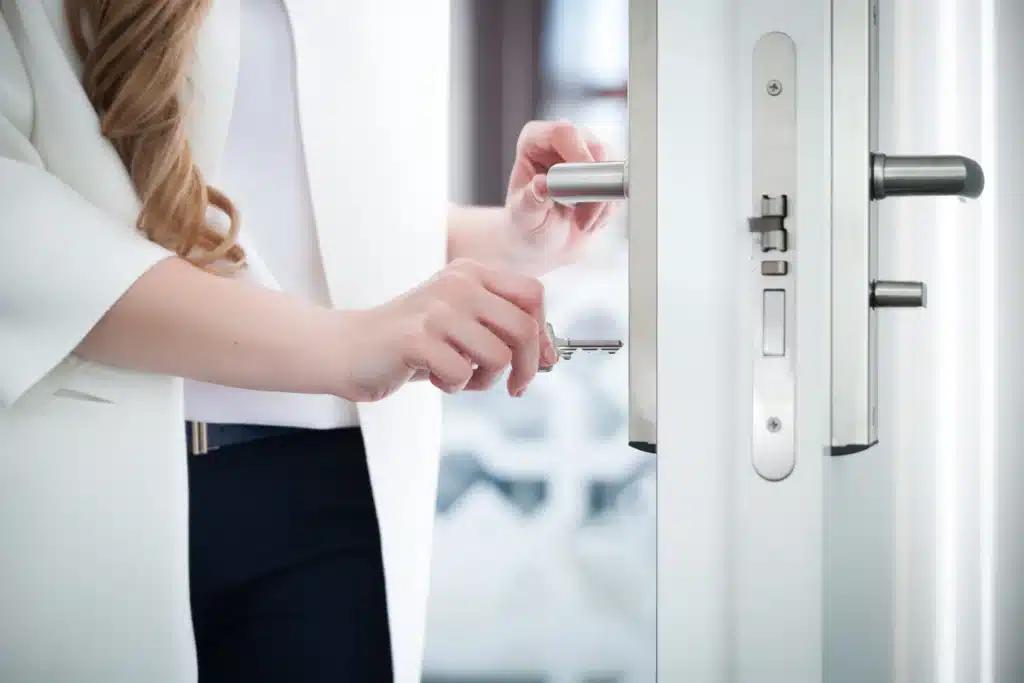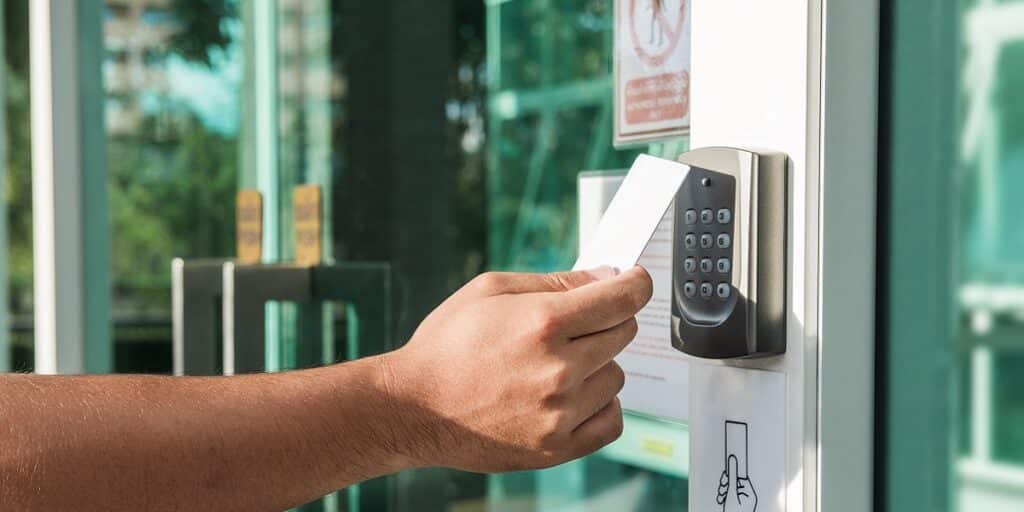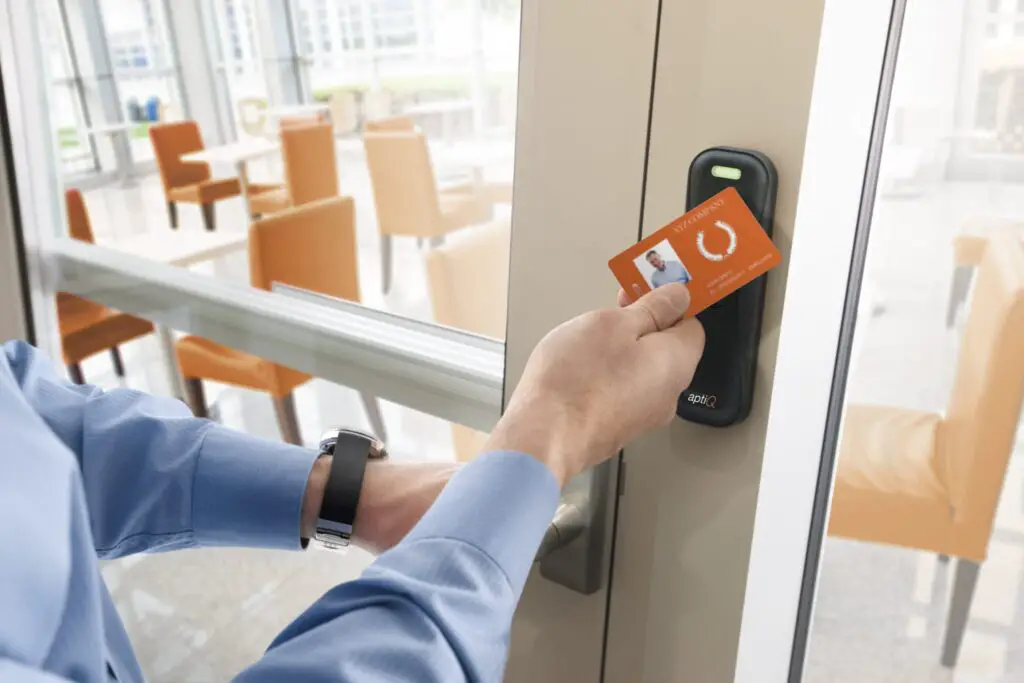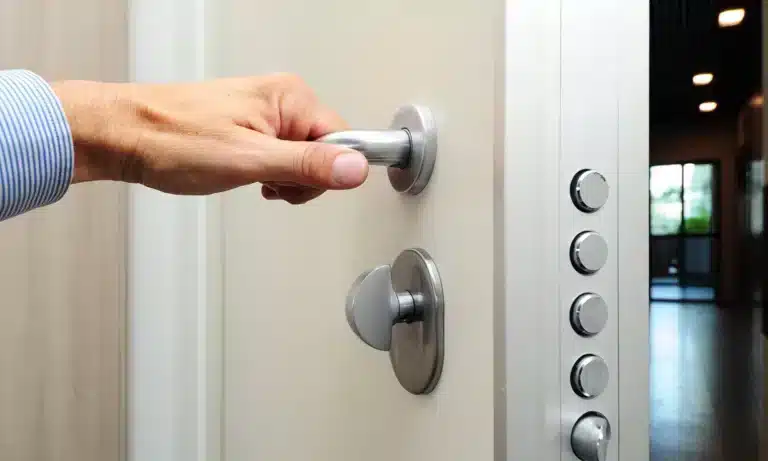Introduction
How To Secure Apartment Door: Securing your apartment is crucial for maintaining your safety and peace of mind. Among all entry points, the apartment door is the primary line of defense against potential intruders. Taking steps to strengthen its security can significantly enhance your overall safety within the premises.
Securing your apartment door starts with a sturdy door composed of wood, metal, or fiberglass. A metal strike plate and longer screws can strengthen the door frame against violent entrance. Consider installing a Grade 1 or Grade 2 deadbolt lock with at least a one-inch throw to prevent tampering.
Apart from the door and lock, consider installing a peephole or a door viewer to identify visitors before opening the door. Additionally, a chain lock can offer an extra layer of security camera, allowing you to partially open the door while maintaining a certain level of control. Another important aspect of securing your apartment door is proper key management. Avoid hiding spare keys outside your apartment, as potential burglars are familiar with common hiding spots. Instead, consider giving a spare key to a trusted neighbor or using a secure keyless entry system.

How do you secure an apartment door from the inside?
If you have an inward-swinging door, consider installing a door jammer and a door brace. While you’re waiting for the locks to be improved—or even after—for extra peace of mind, these simple-to-use tools can add a layer of security.
Securing an apartment door from the inside is essential for maintaining privacy, safety, and peace of mind. There are several effective measures you can take to ensure the security of your apartment door. Here are some key methods:
Install a deadbolt lock: Upgrade your lock to a deadbolt. Deadbolts are more secure than regular locks because they resist forcible entrance. Choose a high-quality lock with a lengthy bolt that penetrates the door frame.
Reinforce the door frame: The door frame must be strengthened to avoid kicking in. Install a security plate or striking plate with longer screws to reinforce the lock area. Door frame reinforcement kits with metal plates and larger screws can strengthen weak places.
Use a door jammer or security bar: Security bars or door jammers are positioned at the base of the door to prevent forcible entry. These portable, effective, and easy-to-use technologies add security.
Consider a door viewer or peephole: Installing a door viewer or peephole allows you to identify who is outside before opening the door. Opt for a wide-angle viewer that provides a clear and wide view of the hallway or entryway.
Keep the door closed and locked: It may sound obvious, but ensuring that your apartment door is always closed and locked when you’re inside is crucial for security. Develop a habit of checking the door before leaving or going to bed.
How do you secure an apartment door that opens outward?
How to Secure a Door That Opens Outward in 6 Steps
- Before You Begin
- STEP 1: Secure and reinforce the hinges.
- STEP 2: Install a latch guard.
- STEP 3: Use a door barricade.
- STEP 4: Install a door security bar.
- STEP 5: Tie the doorknob or handle to a heavy object or piece of furniture.
Securing an apartment door that opens outward requires some unique considerations, but there are still effective methods to enhance its security. Here are some strategies to secure an apartment door that opens outward:
Install a security bar: Security bars or door braces can be put horizontally inside the door to prevent forcible entry. These adjustable bars can endure high pressure. Position the security bar against the door and floor for maximum efficacy.
Use door reinforcement hardware: Use door strengthening hardware designed for outward-opening doors. Heavy-duty plates and longer screws strengthen hinges and latches, making doors difficult to kick in or force open.
Install a door viewer or peephole: Just like with inward-opening doors, installing a door viewer or peephole allows you to identify visitors before opening the door. Look for a wide-angle viewer that provides a clear view of the outside area.
Utilize a door alarm: Door alarms can be attached to the door or door frame and will trigger a loud sound when the door is opened or tampered with. These alarms act as a deterrent and can alert you and neighbors to any potential intrusions.
Communicate with your landlord: If you are concerned about the security of an outward-opening apartment door, it is essential to communicate your concerns with your landlord. They may have additional suggestions or be willing to invest in security upgrades to ensure the safety of the premises.
Should you lock your apartment door?
It’s crucial to practice safe habits because it only takes a few minutes for an experienced burglar to go through your things. Locking your doors should always be a priority if you want to ensure you and your belongings are safe.
Yes, it is highly recommended to lock your apartment door for several important reasons. Locking your apartment door provides a layer of security and helps protect your belongings, personal safety, and privacy. Here’s why you should always lock your apartment door:
Burglary prevention: Locking your apartment door is the first line of defense against burglaries. It deters potential intruders and makes it significantly harder for them to gain unauthorized access. Most burglars look for easy targets, and an unlocked door presents an invitation for them to enter.
Personal safety: Locking your apartment door helps keep you and your loved ones safe. It prevents strangers from walking into your living space, reducing the risk of encountering unwanted visitors or potential threats.
Privacy protection: Locking your apartment door ensures your privacy, giving you peace of mind within your personal space. It prevents unauthorized individuals from entering your apartment, preserving your sense of security and personal boundaries.
Prevention of accidents and misunderstandings: Locking your apartment door can prevent accidents or misunderstandings that may arise from unexpected entry. It avoids potential confrontations with neighbors, maintenance personnel, or others who may mistakenly enter your apartment if the door is left unlocked.
Insurance requirements: Some insurance policies require that you lock your apartment door when you are not at home. Failing to do so may result in the denial of claims in the event of theft or damage.
Should you lock your apartment door at night?
To Prevent Other Break-ins
Leaving your door unlocked overnight can potentially give access to those wishing to do more than steal things. So, it’s very important that you not only make sure your door is locked at night, but also adding some extra security to your door, such as a door chain.
Yes, it is highly advisable to lock your apartment door at night for several crucial reasons. Locking your apartment door provides an extra layer of security and helps ensure your safety and peace of mind while you sleep. Here’s why you should always lock your apartment door at night:
Protection against intruders: Locking your unit at night deters burglars. It prevents break-ins and protects your home by blocking illegal entry.
Enhanced personal safety: By locking your apartment door, you create a secure environment for yourself and your loved ones. It minimizes the chances of encountering unwanted visitors or potential threats during the night, providing a sense of security and protecting your well-being.
Prevention of crimes of opportunity: Leaving your apartment door unlocked at night can attract opportunistic criminals who may take advantage of an easy target. By locking your door, you reduce the likelihood of crimes such as theft or home invasion that can occur when doors are left unsecured.
Peace of mind and better sleep: Locking your apartment door before going to bed offers peace of mind. Knowing that your door is securely locked allows you to sleep better, undisturbed by concerns about potential intrusions or unauthorized access.
Compliance with building regulations: Many apartment buildings and complexes have rules or regulations that require residents to lock their doors at night. By adhering to these rules, you demonstrate your commitment to the safety and security of the entire community.

Can I add an extra lock to my apartment door?
There are various ways to install a lock to your apartment door without replacing the lock and key system. Always with your landlord or building management before making any changes to your living area.
You may usually put a lock to your apartment door, but check with your landlord or building administration first. An extra lock on your apartment door can enhance security and peace of mind. Important considerations:
Review your lease agreement: Before making any modifications to your apartment door, carefully review your lease agreement or consult with your landlord. Some leases may have specific rules or restrictions regarding modifications to the apartment’s entry points. It’s crucial to ensure that you comply with any regulations or obtain permission before proceeding.
Choose the right lock: There are various types of locks available in the market, including deadbolt locks, chain locks, and smart locks. Consider the level of security you desire and the specific needs of your apartment. Opt for a high-quality lock that is sturdy and resistant to tampering or forced entry.
Seek professional installation: Have an experienced locksmith or professional install the extra lock. They have the expertise and tools necessary to ensure proper installation and avoid any damage to the door or frame. Professional installation also helps ensure that the lock functions correctly and provides the intended security benefits.
Preserve the integrity of the door: When adding an extra lock, it is essential to maintain the integrity of the apartment door. Avoid drilling additional holes or damaging the existing lock or frame. There are alternative lock options available that can be installed without significant modifications, such as door jammers or security bars.
Why is it important to secure an apartment door?
Securing an apartment door is of paramount importance for several crucial reasons. It helps protect your property, personal safety, privacy, and provides peace of mind. Here are the key reasons why securing an apartment door is essential:
Prevention of unauthorized entry: Securing your apartment door acts as a deterrent against unauthorized individuals attempting to gain access to your living space. It significantly reduces the risk of break-ins, burglary, and home invasions.
Protection of belongings: A secured apartment door helps safeguard your personal belongings and valuable possessions. It makes it more challenging for thieves to enter and steal your belongings, providing an added layer of protection.
Personal safety: Securing your apartment door is essential for your personal safety and the safety of your loved ones. It helps prevent unwanted visitors or potential threats from entering your living space, reducing the risk of confrontations, intrusions, or harm.
Privacy preservation: An apartment door that is properly secured ensures your privacy. It keeps out unauthorized individuals, preserving your personal space, and allowing you to feel safe and secure within your own home.
Peace of mind: Knowing that your apartment door is secured offers peace of mind. It allows you to relax and go about your daily activities or rest peacefully, free from concerns about potential intrusions or unauthorized access.
What are some basic tips for securing an apartment door?
Securing an apartment door is crucial for maintaining safety and peace of mind. Here are some basic tips to help you enhance the security of your apartment door:
Install a deadbolt lock: Consider upgrading your existing lock to a deadbolt lock. Deadbolts provide increased resistance against forced entry compared to standard locks. Choose a high-quality deadbolt with a long bolt that extends deeply into the door frame.
Reinforce the door frame: Strengthening the door frame is essential to prevent it from being easily kicked in. Install a strike plate with longer screws or a security plate to reinforce the area around the lock. Door frame reinforcement kits can also be used to fortify weak points.
Use a door viewer or peephole: Installing a door viewer or peephole allows you to identify who is outside before opening the door. Opt for a wide-angle viewer that provides a clear and wide view of the hallway or entryway.
Install a door chain or door limiter: Adding a door chain or door limiter provides an extra level of security when opening the door partially. It allows you to interact with visitors while maintaining a level of control over the door’s opening.
Keep the door closed and locked: Develop a habit of always closing and locking your apartment door, even when you are inside. This simple practice significantly enhances security and prevents unauthorized access.
Consider a door alarm system: Installing a door alarm system can alert you to any attempts at forced entry. These systems often emit a loud sound, acting as a deterrent and notifying you of a potential break-in.
How often should I check and maintain my apartment door security?
Checking and maintaining your apartment door security should be done regularly to ensure its effectiveness. Here are some guidelines on how often you should check and maintain your apartment door security:
Regular visual inspections: Perform visual inspections of your apartment door security on a monthly basis. Look for any signs of wear, damage, or tampering on the door, locks, hinges, and strike plates. Address any issues promptly to maintain the security of your door.
Test the locks: Test the functionality of your locks every few months. Ensure that they latch properly and smoothly without any sticking or difficulty. If you notice any problems, such as a loose lock or a key that doesn’t turn smoothly, consider repairing or replacing the lock.
Check the door frame: Inspect the door frame for any signs of weakness or damage, such as cracks, splintering, or warping. Address these issues immediately, as a compromised door frame can undermine the security of the door.
Lubricate moving parts: Lubricate the hinges, locks, and other moving parts of your apartment door annually or as needed. Use a lubricant specifically designed for doors to ensure smooth operation and prevent rust or corrosion.
Reinforce weak points: Regularly assess the weak points of your apartment door security, such as the strike plates or door frame. Reinforce these areas with longer screws, security plates, or door frame reinforcement kits as necessary.
Update security measures: Consider upgrading your locks, adding security devices like door alarms or cameras, or implementing smart lock systems to enhance the security of your apartment door.

Conclusion
Securing your apartment door is a crucial step in ensuring the safety and well-being of yourself and your household. By following the practical tips and techniques, you can significantly enhance the security of your apartment door and create a stronger barrier against potential intruders.
Starting with a solid and robust door made of materials like solid wood, metal, or fiberglass, coupled with a reinforced door frame, forms the foundation of a secure apartment door. Installing a high-quality deadbolt lock with a one-inch throw and a sturdy strike plate further fortifies the door’s resistance to forced entry.
Additional security measures, such as installing a peephole or a door viewer, a chain lock, and a secure key management system, add extra layers of protection. These measures allow you to verify visitors, control access, and prevent unauthorized entry. Regular maintenance and inspection of your apartment door and lock are essential for optimal security. Lubricating hinges and locks, addressing any damages promptly, and ensuring that all components are functioning correctly will help maintain the door’s integrity.
Remember, securing your apartment door is an ongoing process. Stay informed about the latest security technologies and techniques, and adapt your security measures accordingly. Stay connected with your neighbors and community to exchange information about potential security threats and take collective actions to maintain a safe environment.

